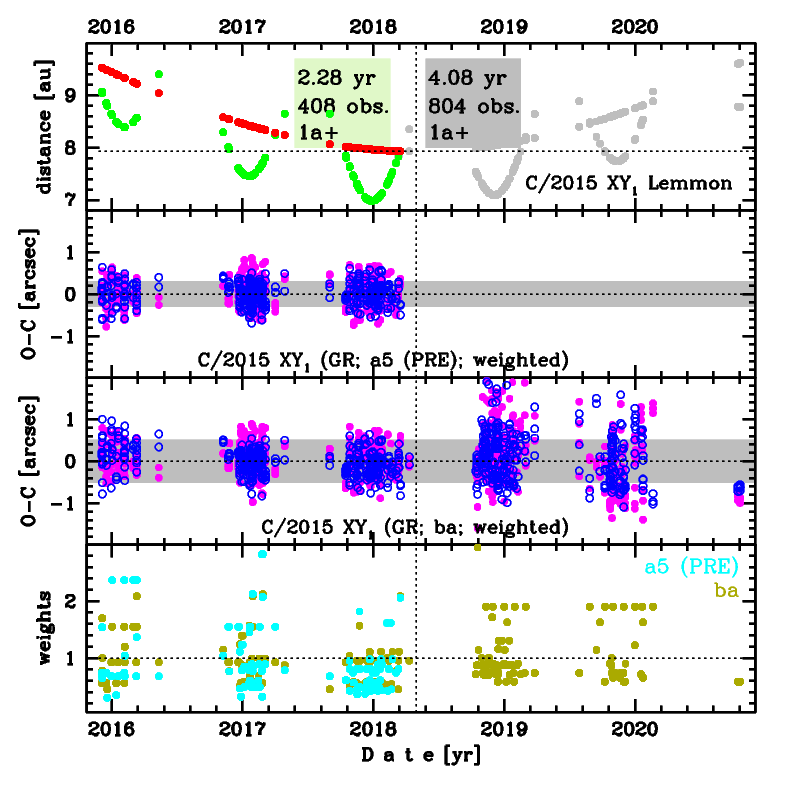C/2015 XY1 Lemmon
more info
Comet C/2015 XY1 was discovered on 4 December 2015 with Mount Lemmon survey, that is about 2.4 yr before its perihelion passage, and was observed until 1 January 2020.
Comet had its closest approach to the Earth on 27 December 2017 (6.984 au); about 4 months before its perihelion passage.
Solutions given here are based on data spanning over 4.88 yr in a range of heliocentric distances from 9.52 au 7.928 au (perihelion) – 9.62 au.
This Oort spike comet suffers slight planetary perturbations during its passage through the planetary system; however, these perturbations can lead to escape the comet from the planetary zone on a marginally hyperbolic orbit (see future barycentric orbit for solution ra).
See also Królikowska and Dones 2023.
Comet had its closest approach to the Earth on 27 December 2017 (6.984 au); about 4 months before its perihelion passage.
Solutions given here are based on data spanning over 4.88 yr in a range of heliocentric distances from 9.52 au 7.928 au (perihelion) – 9.62 au.
This Oort spike comet suffers slight planetary perturbations during its passage through the planetary system; however, these perturbations can lead to escape the comet from the planetary zone on a marginally hyperbolic orbit (see future barycentric orbit for solution ra).
See also Królikowska and Dones 2023.
| solution description | ||
|---|---|---|
| number of observations | 738 | |
| data interval | 2015 12 04 – 2020 01 01 | |
| data type | perihelion within the observation arc (FULL) | |
| data arc selection | entire data set (STD) | |
| range of heliocentric distances | 9.52 au – 7.93 au (perihelion) – 9.62 au | |
| detectability of NG effects in the comet's motion | NG effects not determinable | |
| type of model of motion | GR - gravitational orbit | |
| data weighting | YES | |
| number of residuals | 1439 | |
| RMS [arcseconds] | 0.51 | |
| orbit quality class | 1a+ | |
| next orbit statistics, both Galactic and stellar perturbations were taken into account | ||
|---|---|---|
| no. of returning VCs in the swarm | 0 | |
| no. of escaping VCs in the swarm | 5001 | * |
| no. of hyperbolas among escaping VCs in the swarm | 0 | |
| next reciprocal semi-major axis [10-6 au-1] | 5.22 – 5.94 – 6.67 | |
| next perihelion distance [au] | 244.2 – 245.6 – 246.9 | |
| next aphelion distance [103 au] | 300 – 340 – 380 | |
| synchronous stop epoch [Myr] | 3.38 | S |
| percentage of VCs with qnext > 20 | 100 | |

Upper panel: Time distribution of positional observations with corresponding heliocentric (red curve) and geocentric (green curve) distance at which they were taken. The horizontal dotted line shows the perihelion distance for a given comet whereas vertical dotted line — the moment of perihelion passage.
Middle panel(s): O-C diagram for a given solution (sometimes in comparison to another solution available in CODE), where residuals in right ascension are shown using magenta dots and in declination by blue open circles.
Lowest panel: Relative weights for a given data set(s).
Middle panel(s): O-C diagram for a given solution (sometimes in comparison to another solution available in CODE), where residuals in right ascension are shown using magenta dots and in declination by blue open circles.
Lowest panel: Relative weights for a given data set(s).
| next_g orbit statistics, here only the Galactic tide has been included | ||
|---|---|---|
| no. of returning VCs in the swarm | 0 | |
| no. of escaping VCs in the swarm | 5001 | * |
| no. of hyperbolas among escaping VCs in the swarm | 0 | |
| next reciprocal semi-major axis [10-6 au-1] | 4.13 – 4.87 – 5.63 | |
| next perihelion distance [au] | 2.861 – 2.865 – 2.87 | |
| next aphelion distance [103 au] | 360 – 410 – 480 | |
| synchronous stop epoch [Myr] | 3.46 | S |
| percentage of VCs with qnext < 10 | 100 | |